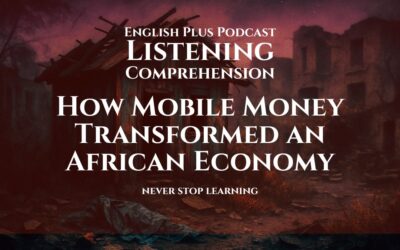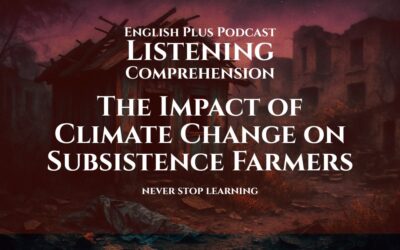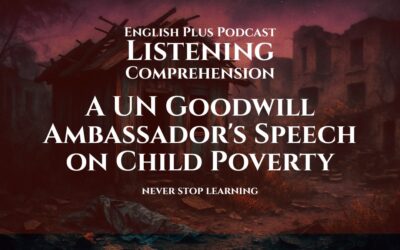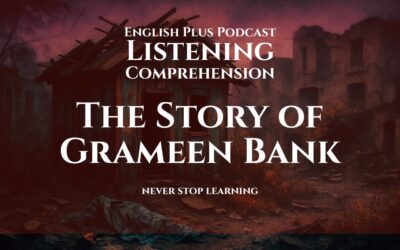English Plus Magazine
Dive into a world of ideas, stories, English and discovery.
Letter from the Editor

Outsmarting the Algorithm: How to Pivot When AI Does It Better
Resilience in the Age of AI
Let’s be honest about what you’re feeling right now. It’s not just annoyance. It’s not just a concern about job security. It’s something deeper. It’s a specific kind of grief.
You have spent ten, maybe twenty years building a fortress of knowledge. You read the books. You put in the late nights. You honed your syntax, or your code, or your design eye until it was sharp enough to cut glass. You built your identity on being the person who knows things, the person who can execute high-quality work faster than anyone else in the room.
And then, almost overnight, the landscape shifted. You watched a machine churn out a draft, a solution, or a strategy in four seconds that would have taken you four hours. And maybe, just maybe, the machine’s version was actually… good.
That realization feels like a gut punch. It feels like you’ve been bested. You look at that screen and you think: If this tool can do what I do, then what am I for?
If you are asking that question, you are already halfway to the solution. Most people don’t ask. They deny. They mock the AI, pointing out its hallucinations or its stiff prose, clinging to the hope that it’s just a fad. That is a losing strategy. Denial is not a plan.
Here is the reality we have to accept before we can move forward: You can no longer compete on information recall. You can no longer compete on syntax generation. You can no longer compete on speed.
If your value proposition is “I know a lot of facts and I can type them out quickly,” you are in trouble. But here is the good news, and I mean this sincerely: That was never your actual value. That was just the labor. Your actual value is something the machine hasn’t touched yet, and that is where we are going to build your new fortress.
Today, we are going to break down exactly how to pivot. We aren’t going to talk about “embracing the future” with vague optimism. We are going to look at the mechanics of resilience. We are going to restructure your workflow and your mindset so that you stop competing with the machine and start standing on top of it.
Let’s break this down into three phases: The Mental Shift, The Strategic Audit, and The Execution Protocol.
Phase One: The Mental Shift
Resilience in this context isn’t about “toughing it out.” It’s about reframing your relationship to the work.
For your entire career, you have likely been an Operator. An Operator is someone who does the thing. You write the email. You debug the line of code. You grade the paper. You are the engine.
The AI revolution forces you to become a Conductor.
Think about an orchestra. The violin player is skilled. They have dexterity and timing. But the conductor? The conductor doesn’t make a sound. The conductor doesn’t touch a string. Yet, without the conductor, you don’t have a symphony; you have noise. The conductor understands the intent of the music. They understand pacing, emotion, and the overall architecture of the piece.
The AI is now the violin player. It is a very fast, very tireless violin player. If you try to grab the bow and play faster than it, you look ridiculous. Your job now is to stand on the podium.
This requires a painful ego death. You have to stop taking pride in the grind. We have been conditioned to believe that if we didn’t sweat over the first draft, we didn’t earn the final product. You need to let that go. The grind is no longer the metric of value. The outcome is the metric of value. The insight is the metric of value.
So, the first step is to stop asking, “How can I do this better than the AI?” and start asking, “How can I use the AI to get to the solution I envision?”
You are moving from Production to Direction.
Phase Two: The Strategic Audit
Now that we’ve adjusted the mindset, let’s look at your inventory. You feel like your experience has been negated. That is factually incorrect. Your experience is the only thing keeping the AI from producing garbage.
AI models are probability engines. They predict the next word or pixel based on an average of human data. They are the ultimate “average” generators. They lack three things that you possess: Context, Nuance, and Taste.
Let’s look at Context.
A machine can write a marketing strategy for a coffee shop. But it doesn’t know that your specific coffee shop is in a neighborhood that resents gentrification, and therefore using words like “luxury” or “exclusive” will actually alienate your customer base. It doesn’t know the history of the street corner. It doesn’t know the subtle emotional temperature of your team.
Your experience gives you that context. You know why certain strategies fail, not because the data says so, but because you’ve seen the human fallout.
Next is Nuance.
AI struggles with subtext. It struggles with the unsaid. In negotiation, in high-level teaching, in complex storytelling, the power is often in the silence between the words. It’s in the deliberate ambiguity. A machine optimizes for clarity and pattern matching. It flattens the curve. You, with your lifetime of reading rooms and reading minds, know when to be ambiguous. You know when to break the rule.
Finally, and most importantly, Taste.
This is the big one. As AI floods the world with content—infinite blog posts, infinite images, infinite code—we are entering an era of noise. The scarcity is no longer “content.” The scarcity is “curation.”
Who decides what is good? Who decides what is relevant?
You do.
Your twenty years of experience have refined your taste. You know what a great sentence sounds like. You know what elegant code looks like. You can look at ten AI-generated options and immediately identify the one that has a spark, and the nine that are derivative trash. That filter? That is your new currency.
So, here is your strategic audit. I want you to sit down and list every skill you have. Then, I want you to circle the ones that require high emotional intelligence, local context, or subjective judgment.
Those circled items? That is your job now. Everything else? Delegate it to the machine.
Phase Three: The Execution Protocol
We have the mindset. We have the strategy. Now, let’s talk about Monday morning. What do you actually do?
Step 1: The Integration Hour.
You cannot direct a tool you do not understand. If you are feeling overwhelmed, it’s usually because you are looking at AI as a monolith. You need to get your hands dirty.
Dedicate one hour a day to “breaking” the AI. Don’t just use it to write a generic email. Push it. specific, complex prompts. See where it fails.
When you find the failure point, that is where you step in.
For example, if you are a writer, have it write a story. Watch where it falls into cliché. Your job is to rewrite the cliché. You are now the editor-in-chief of a very prolific but unimaginative junior writer.
Step 2: Raise Your Baseline.
Because the machine handles the basics, your baseline of quality must go up. “Good enough” is dead. “Competent” is now free.
If you used to deliver “competent” reports, you are now obsolete. You must deliver insightful reports. You must deliver actionable wisdom.
Use the time the AI saves you on drafting to spend more time on thinking. If it takes you 10 minutes to generate the data analysis instead of 4 hours, use those saved 3 hours and 50 minutes to figure out what the data actually means for the future of the company.
Shift your energy from “gathering” to “synthesizing.”
Step 3: Human-to-Human Connection.
The more digital the world becomes, the more valuable the analog becomes.
If you are a teacher, the lecture can be an AI video. But the mentorship? The hand on the shoulder? The specific encouragement to a student who is struggling with self-doubt? That is 100% you.
If you are a consultant, the data processing is the machine. But the trust? The ability to look a client in the eye and say, “I’ve seen this before, and we’re going to be okay”? That is you.
Double down on your humanity. Be the person people want to talk to, not just the person who sends the file.
Step 4: Continuous Reinvention.
This is the hardest part. You have to accept that the learning curve never flattens again. The tool you master today will be outdated in six months.
Resilience is not a state of being; it’s a habit of adaptability. You must become comfortable with being a novice.
Remember when you were starting out? That hunger? That willingness to look stupid while you figured it out? You need to find that again. The “expert” mindset is rigid; it breaks under pressure. The “learner” mindset is flexible; it bends and snaps back.
The Bottom Line
Let’s wrap this up. I know it’s scary. It is valid to mourn the old way of doing things. It was comfortable. We knew the rules.
But the rules have changed.
You haven’t been bested. You’ve been promoted. You have been promoted from the assembly line to the design studio.
The machine can answer the question. Only you can ask the right one.
The machine can parse the data. Only you can find the meaning.
The machine can simulate empathy. Only you can actually care.
Your lifetime of learning wasn’t a waste. It was the training ground for this exact moment. It gave you the wisdom to wield this new power responsibly.
Don’t compete. Orchestrate.
Don’t produce. Curate.
Don’t retreat. Lead.
Get up. Dust off that experience. We have work to do.
English Plus Magazine
How Mobile Money Revolutionized an Economy | Listening Comprehension
Boost your listening comprehension for TOEFL, IELTS, and other international exams. Listen to a lecture on the economic impact of mobile money in Kenya and test your skills with 10 questions.
Beyond Charity: The Innovations Reinventing the Fight Against Poverty
Discover the groundbreaking solutions changing how we fight global poverty. Learn about microfinance, Universal Basic Income (UBI), and mobile money—unconventional tools that empower, not just aid.
Climate Change and Subsistence Farming | Listening Comprehension
Enhance your listening skills for international exams with this advanced listening practice. Hear a report on how climate change impacts farmers and test your comprehension with 10 questions.
The Hidden Blueprint: How Global Systems Keep Nations Poor
Why do poor countries stay poor? Explore the systemic reasons, from colonialism’s economic legacy and unfair trade rules to debt traps, and discover how the global economy can perpetuate poverty.
A Speech on Child Poverty | Listening Comprehension
Sharpen your English listening skills for international exams with this advanced practice test. Listen to a powerful speech on child poverty and answer 10 challenging comprehension questions.
The Story of Grameen Bank and Microcredit | Listening Comprehension
Improve your advanced English listening skills for exams like TOEFL and IELTS with this practice test. Listen to a lecture about Muhammad Yunus and the Grameen Bank, and answer 10 comprehension questions.
The Many Faces of Poverty: Why Income Is Only Half the Story
Poverty isn’t just about a lack of money. Explore the concept of multidimensional poverty and discover why access to healthcare, education, and clean water reveals the true reality of global inequality.
The Antidote to Polarization: Can Critical Thinking Heal Our Divided World?
Explore how the decline of critical thinking fuels political polarization and social media echo chambers. Discover how intellectual humility and good-faith arguments can help heal our divisions and strengthen democracy.
The Examined Life: Applying Critical Thinking to Your Health, Finances, and Happiness
Take critical thinking out of the abstract and into your daily life. Learn to evaluate wellness fads, avoid financial biases, and use self-reflection to improve your health, wealth, and happiness.
The Most In-Demand Skill: Why Critical Thinking is Your Biggest Career Asset
In an age of AI and automation, critical thinking is the top skill employers need. Learn how it drives innovation and leadership, and get practical tips to showcase it on your resume and in job interviews.
Beyond Memorization: How to Raise a Generation of Critical Thinkers
Discover why rote learning is failing our kids and how to fix it. This guide offers parents and educators practical tips on fostering curiosity, teaching media literacy, and promoting inquiry-based learning to raise a generation of critical thinkers.
Learn the Sherlock Holmes Method of Deduction for Exam Success | Listening Comprehension
Boost your listening and critical thinking skills for the SAT, TOEFL, and IELTS by studying the Sherlock Holmes method. Includes a full listening lecture, vocabulary, and a 10-question quiz.












